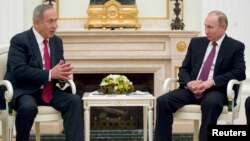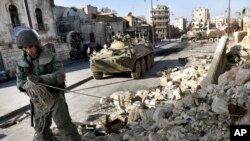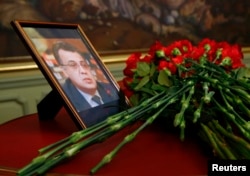Israel’s prime minister was in Moscow Thursday to talk with Russia’s president about the Syrian crisis, the latest sign of Russia’s growing influence in the Middle East as well as Israel’s concerns over Moscow’s regional allies.
Benjamin Netanyahu and Vladimir Putin made no joint statement following the talks, but Netanyahu later issued a statement indicating he had “made it clear” to Putin that Israel wants to prevent any Syrian settlement from leaving “Iran and its proxies with a military presence” in Syria.
Russia has come to assume a larger role in Israel’s foreign policy calculations since the Kremlin’s intervention in the Syrian conflict in September 2015.
While Putin at the time justified Russia’s actions as taking the fight to global terrorists and the Islamic State, Western critics argue the intervention was also aimed at salvaging the government of besieged Moscow’s ally, Syrian leader Bashar al-Assad.
Russia's wider role
It’s that later mission that many in the West, begrudgingly, agree has succeeded -- for now.
Russia’s role in helping Assad’s forces take the rebel city of Aleppo in December 2016, in particular, signaled a key turning point in the war.
Independent human rights groups say the victory was accomplished with a ruthless Russian-Syrian air campaign targeting civilians. Russia denies those charges.
Israel has largely stayed out of the Syrian conflict, save for working with Russia to avoid potential clashes with Israel’s military operations along the Syrian border.
Israel eyes Iran
Yet it is Russia’s wider military alliance in Syria, alongside traditional Israeli foes Iran and Hezbollah, that is causing alarm among Israeli officials.
In particular, Israel is nervous about the prospect of Iranian military forces gaining a permanent foothold in the Israeli-held border region of the Golan Heights.
“Russia has made a very important contribution,” said Netanyahu in a statement acknowledging Russia’s efforts against Islamic State targets in Syria.
He added that he told the Russian leader “naturally, we do not want this terrorism to be replaced by the radical Shiite Islamic terrorism led by Iran.”
Russian influence
Russian experts on the Middle East suggested Putin’s influence on Iran was questionable, arguing the countries’ alliance was based more on circumstance than tradition.
“Russia and Iran ... they’re both dependent on one another,” said Middle East specialist Karina Gevorkyan in an interview with VOA.
In addition to their support of the Assad regime, she points to economic and Russian weapons sales to Iran as fueling the current partnership.
But it’s a relationship, Gevorkyan said, built on pragmatism above all else.
“Can Putin promise Netanyahu to raise the issue with the Iranians? Yes, he can. And the Iranians might well agree, if they see it in their interests,” she said.
Gevorkyan adds that Iran is pursuing its long-term influence in the region, with Israel cast in the role of bogeyman in case plans go astray.
The Russian-Israeli meeting came one day before a visit to Moscow by another Middle East powerbroker and U.S.-NATO ally, Turkish leader Recep Tayyip Erdogan.
That relationship, too, has seen its ups and downs surrounding the Syrian war.
Late last year, Russia’s ambassador to Turkey was gunned down in public by a Turkish assassin. Before being shot by police, the gunman said he was avenging Russia’s role in the Aleppo siege.
The murder underscored the complexity of Moscow’s current political pivot from its role as backer of the Syrian regime to the primary mediator in the Syrian conflict.
Talks in Kazakhstan
In February, Moscow sponsored talks between Damascus and the Syrian opposition in neighboring Astana, Kazakhstan.
While results have thus far proved minimal, few doubt Russia is eager to show it can deliver what Western powers could not: a resolution to the vexing six-year conflict.
The next phase of talks in Astana is to resume next week.
Yet largely missing from the equation has been Washington.
The Obama administration had what critics saw as an on-again, off-again engagement on the Syrian issue.
Efforts by then-U.S. Secretary of State John Kerry to make headway with Russia on the Syrian issue in the final year of the Obama presidency failed to produce results.
By contrast, U.S. President Donald Trump has indicated his desire to recruit Moscow in a grand coalition against Islamic State, a position welcomed broadly in the Kremlin.
Yet the American president has pulled back on cooperating with Russia amid multiple investigations into Russian interference in the American election, allegedly on Trump’s behalf.
In Moscow, the scandal has fed a sense that, whatever Trump’s wishes, the American leader may prove unable to pursue an alliance he claims to want in the interests of his own political survival.






